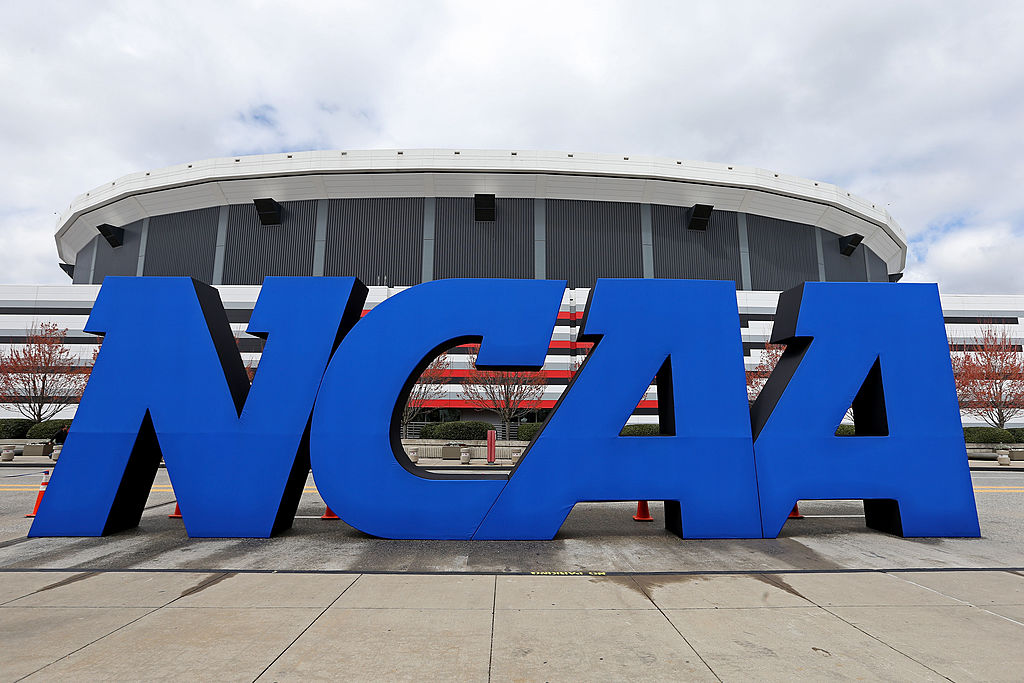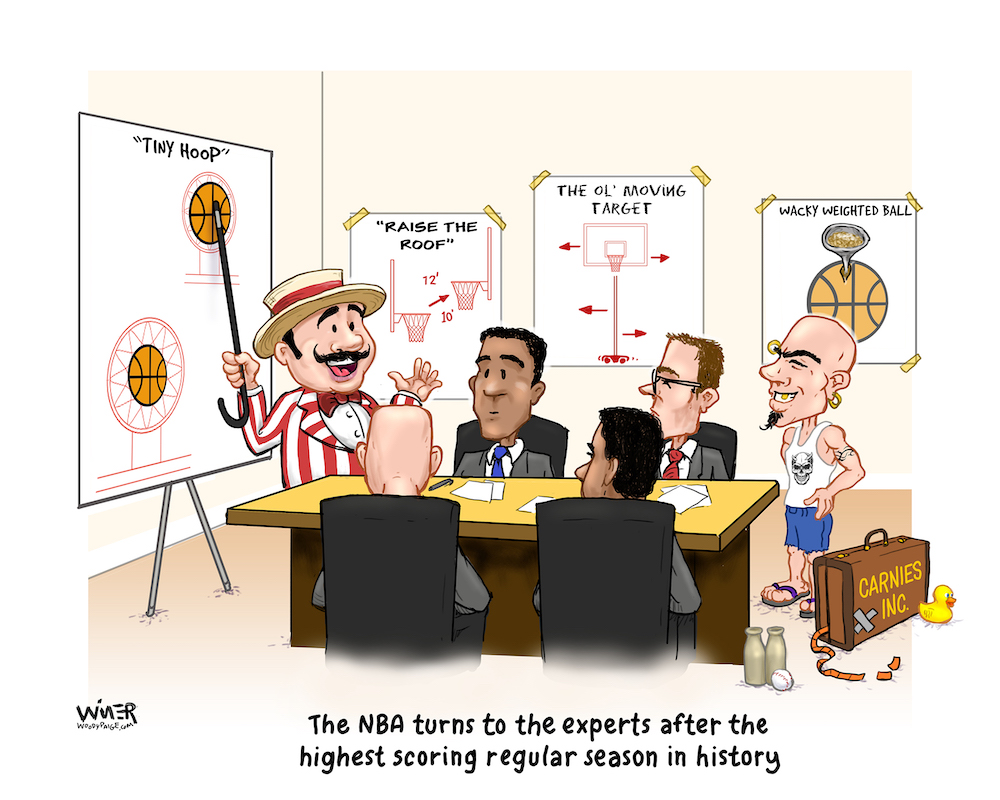In Colorado, we’re dealing with a lack of a new carriage agreement between a regional sports network, Altitude Sports and Entertainment, on one side; and Comcast, DISH and DirecTV on the other.
With the agreements lapsed, Altitude’s programming — most notably Denver Nuggets and Colorado Avalanche games — won’t be available to many Colorado consumers until new contracts are signed.
(If they ever are.)
The Avalanche’s first two games of the regular season, at home against Calgary and Minnesota, weren’t on any of the “Big 3,” triggering both consternation and also whispers that it’s possible to skirt the system and watch the games, anyway.
(I believe some of those doing the whispering also sell $35 “Rolex” watches from their briefcases and $22 “Gucci” handbags from their trunks.)
The Avalanche finishes a homestand against Boston Thursday and Arizona Saturday. The Nuggets’ first regular season game is at Portland on October 23.
This is all complicated by the fact that Altitude is an independent regional sports network founded in 2004 and owned by Kroenke Sports and Entertainment.
KSE, in turn, is part of the family empire that effectively (with some fine-print disclaimers) includes the Los Angeles Rams, Nuggets, Avalanche, indoor lacrosse’s Colorado Mammoth, soccer’s Colorado Rapids and the London-based Arsenal FC in the English Premier League.
They’re all controlled by Stan Kroenke and his wife, Ann Walton Kroenke, who between them are worth nearly $17 billion.
Ann officially owns the Nuggets and Avalanche, though Stan is prominently featured in the team media guides and on the team web sites as owner of Kroenke Sports and Entertainment, and Ann is not listed on the teams’ corporate charts.
Their son, Josh, is president of both teams.
In our household, we have Comcast. With no programming on the Altitude slot now, there is a message about the agreement’s expiration with elevator / hold music. (It’s kind of catchy, actually.)
Amid all this, the war of words has been noticeable. At times, it comes off as if Altitude is saying more viewers watched the Avalanche-Columbus Blue Jackets game last season than saw the final episode of M*A*S*H. And the Big 3 rhetoric would have you believe that C-SPAN’s coverage of the House hearing on alfalfa prices outdrew Altitude’s broadcast of the Nuggets-Lakers.
KSE and the Kroenke family have been good for Denver and for Denver sports.
I’m not going to take sides in a business dispute between mega-corporations and a wing of the richest family in America, except to note that Altitude’s PR campaign, saying the Big 3 are “blocking” team broadcasts, is unfortunate. The contracts were up. The Big 3 aren’t carrying Altitude, and can’t without new agreements. That’s not “blocking.” Intelligent consumers dismiss the DON’T BLOCK MY (ALTITUDE, AVS, NUGGETS … ) campaign as ridiculous. That’s too bad because it deflects attention from issues where Altitude’s positions are more defensible.
Matt Hutchings, executive vice president and COO of Kroenke Sports and Entertainment, plus president and CEO of KSE Media Ventures, took to the airwaves on Altitude Sports Radio Wednesday. On the KSE morning show with Marc Moser, Vic Lombardi and Brett Kane, Hutchings again laid out the KSE / Altitude position and provided an update. I’ve posted what he said here.
Eventually, he also went on the station’s other two daytime shows and repeated the same message. I respect all involved and understand the need to be loyal to the employer, so I get why he wasn’t challenged or asked tough — even “devil’s advocate” — questions.
The additional issue, other than pure money, also is whether Altitude would accept being relegated like an English football team, going from being included in basic packages to extra “tiers.”
On the other side, the mega-corporations staking out the position as being benevolent watchdogs for consumers also is dubious. They’re responding to criticism of sky-high monthly bills, but that’s more about trying to avoid the loss of subscribers than being consumer advocates.
Against that backdrop, as the Colorado drama plays out, an amazing number of consumers and even media members seem to think this is about how much Altitude pays the Big 3 to get carriage for its programming.
It’s the other way around.
The major issue is how much the cable and satellite companies pay Altitude (and the Kroenkes) for the right to carry the sports network.
Yes, Stan Kroenke is an individual whose company is tussling with megafirms, but he and KSE can handle it. Kroenke treats such negotiations, whether with individuals or businesses, as a competition, and the dollars are the scorekeeping device. KSE, and especially Altitude, are well-known for being, well, surprisingly cost-conscious.
I’d think someone in Kroenke’s position would negotiate hard, or have his representatives negotiate hard, but accept the best price he can get and have Altitude continue to be the operation’s promotional arm.
The Nuggets pay a backup center $14 million, for heaven’s sake. Altitude can’t accept less than it hoped for, even if it seems a loss leader? KSE’s position at least comes off as if it presenting Altitude as a separate company, needing a sustainable model, without taking into consideration that it’s part of an empire. It’s mind-boggling that this has lasted this long.
If an independent regional sports network, connected to sports franchises’ ownership, all owned by an astoundingly wealthy man (and an astoundingly wealthy couple), can’t survive under that model, the model has become at least flawed and perhaps even outmoded.
Actually, none of the Big 3 have any moral obligation to buy and carry Altitude programming at all, once the contracts expired.
Microsoft co-founder Paul Allen, at the time the owner of both the Portland Trail Blazers and Seattle Seahawks, tried it in Portland with the Action Sports Cable Network before giving up in 2002 after only a year of operation.
The reason? ASCN couldn’t get basic-cable carriage on AT&T Broadband, then the region’s dominant cable company.
That was 17 years ago, but still a lesson.
The Big 3 is attempting to curb or pare programming acquisition costs, arguing that consumers that aren’t sports fans should no longer be forced to “pay” to receive sports networks as part of basic packages or anywhere else on the system.
Similar skirmishes are going around the country. The latest example is DISH not carrying NBC Sports Chicago after they couldn’t agree to a temporary extension while talks continued. DISH also isn’t showing Fox sports regionals or Fox/FS1.
It’s obvious that the quibbling is just getting started.
NHL Commissioner Gary Bettman is scheduled to be in snowy Colorado Thursday for a news conference at the Air Force Academy outside Colorado Springs, plugging the February Kings-Avalanche Stadium Series game. Presumably, he’ll be at the Bruins-Avalanche game Thursday night in Denver and will be counted on to fire some volleys about the Altitude fight if he is made available to the media.
The solution is obvious.
Every time I mention this, I’m lectured that it can’t be done, it’s impractical and unsustainable, it has been tried on piecemeal basis before and the economics couldn’t work.
No, I’m not talking about streaming. Or complete cord-cutting.
I also concede the marketplace is changing by the minute. Also, a 14-year-old will come up with another new carriage concept by Thanksgiving and become a gazillionaire.
Yet I’m hard-headed.
The answer is pure a la carte cable and satellite packages. Not package choices, not tiers … pure station-by-station / network-by-network choices.
I realize many stations / networks are free to the companies, but that doesn’t deter me.
I should be able to select from all the stations in the cable or satellite company lineup. Each would have a listed monthly price, based on the acquisition cost, whether it’s relative pennies or considerably more. I would have my choice of everything from WGN America, to ESPN, to Hallmark, to NHL Network, to Gem Network, to the History Channel, to Syfy, to Home Box Office … and more.
I would be required to reach a minimum total to cover costs, but I wouldn’t have anything I hadn’t signed up for.
No “packages,” but individual choices.
I would click boxes and watch the cost of my monthly bill rise. I would note the total in the cart, wince, go back and unclick a few of the boxes. I would click the box saying I’m agreeing to all the terms and that the offer is limited to stock on hand and void in Nebraska … and I have my package.
So if I want Altitude, I buy it. Alone. Not in a package.
If I don’t, I don’t.
I looked through Comcast’s channel lineup in our area. Based on our family interests, I made 30 choices, including local network stations. Sports are heavily represented with other eclectic choices. If my bill turned out to be higher than it is now, at least I’ve made those choices and it’s up to me to pare if need be.
Then, for dessert, I’d take the apple pie a la mode.
Cut through everything else, and it’s about — surprise — money. They’ll find a way to get this settled.
I hope.
That would be best for consumers and for the many hard-working, professional folks toiling for Altitude…or other sports network professionals in other markets also worrying about their livelihood.
Those are the folks I’m most concerned about — not the companies involved.
About Terry: Terry Frei is the author of seven books. His novels are Olympic Affair and The Witch’s Season, and among his five non-fiction works are Horns, Hogs, and Nixon Coming, Third Down and a War to Go, and ’77: Denver, the Broncos, and a Coming of Age. Information is available on his web site, terryfrei.com. His woodypaige.com archive can be found here.





















Very thorough coverage of both sides. I would like to point out DirecTV charges me a monthly fee for Regional Sports Networks and the fee did not decrease when the agreement with Altitude expired.
Your solution is 100% correct and I have been telling the various carriers I have used exactly that every time I get the chance. Instead, I have to pay for a package of 200+ stations, then take the time to program my “Favorites” to avoid having to jump over all the crap I NEVER WILL watch! I mostly watch sports, plus local stations for news and a few regular shows…that’s it!!
I also think, that much like a policeman or detective trying to get co-conspirators to turn on one another, the first of the Big 3 to make a deal stands to get my business (or I will add TV to my TDS Internet subscription).
All consumers have wanted that model for decades, but the individual channels will tell you they would cost upwards of $150 or more per month minimum to exist. 95% or more would cease to exist……so maybe you are onto something here……
Cable viewers are cancelling their subscriptions in record numbers over high bills and paying for channels they don’t watch, and younger people have never signed up at all. I can’t fault the Big Three for belt tightening when they are losing thousands of customers every day and have no chance of reaching the younger demographics. Live sports is the final battleground and I believe this is just the beginning. In addition to your ala-carte idea, on the Altitude side I’d like to see them offer a reasonable monthly streaming subscription, in the neighborhood of $10/month. In comparison, I pay $50/year to NBC to be able to watch cycling events. And for those that think streaming is for phones or laptops, I never use those devices at all to watch NBC’s service. Finally, they could attract new customers to their product and advertisers by putting one game per week on an over-the-air channel. Yes, I’ve heard the tired reasons that this wouldn’t work (Colorado Rockies baseball tried it once) but put some creativity into it!
Come on Kroenke, violate your principles, do it for your fans, demand a few less bucks from from the ‘Big 3″